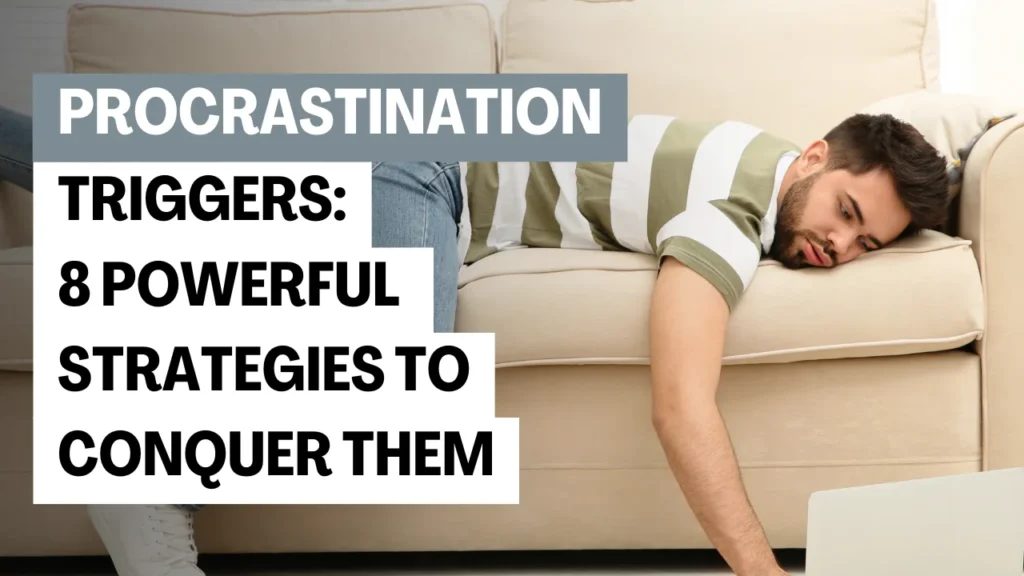Physical Address
304 North Cardinal St.
Dorchester Center, MA 02124
Physical Address
304 North Cardinal St.
Dorchester Center, MA 02124

Procrastination is often dismissed as a simple lack of motivation, but it’s far more complex, involving deep-rooted procrastination triggers that affect countless individuals. It’s a behavioral pattern that hinders personal growth and productivity, often stemming from fear, stress, or a lack of direction. Recognizing procrastination triggers as more than a habit is vital for regaining control over your time and energy.
Procrastination doesn’t just delay tasks; it creates a domino effect fueled by procrastination triggers. Missed deadlines lead to stress, anxiety, and diminished self-esteem, while prolonged avoidance disrupts mental clarity and long-term goals, leaving you stuck. Identifying the specific triggers behind this behavior allows you to address the root causes, not just the symptoms, paving the way for lasting change and a more efficient, peaceful life.

Procrastination is the act of delaying or avoiding tasks, even when you know it leads to negative outcomes. It’s not simply poor time management. it’s often a coping mechanism for deeper emotional struggles.
Neurologically, procrastination stems from the battle between the limbic system, which seeks instant gratification, and the prefrontal cortex, responsible for decision-making and long-term planning. This inner conflict often leaves us choosing short-term comfort over long-term success.
Contrary to popular belief, procrastination isn’t always about laziness. It can stem from perfectionism, fear of failure, or even fear of success. Understanding these misconceptions can shift the way you approach your procrastination tendencies.

Procrastination can be subtle. It often masquerades as busyness. engaging in low-priority tasks to avoid more important ones. Recognizing this pattern is the first step toward change
Not all pauses are procrastination. A healthy break rejuvenates; avoidance leaves you drained and unfulfilled. Understanding the difference helps you reclaim control over your time.
Procrastination often follows predictable patterns. Maybe it strikes when you face overwhelming tasks or when you’re uncertain about the next steps. Identifying these triggers can help you interrupt the cycle.

Emotions like fear and anxiety are powerful procrastination drivers. Perfectionism, while seemingly positive, often leads to paralysis, as you hesitate to begin tasks you fear won’t meet your high standards.
Your surroundings play a significant role in your productivity. A cluttered workspace or lack of proper tools can create barriers, encouraging procrastination.
Mental roadblocks such as feeling overwhelmed, unclear goals, or decision fatigue can stop you from taking action. Simplifying these cognitive burdens is crucial for overcoming procrastination.

Fear, perfectionism, and self-doubt are powerful forces that keep procrastination alive. Fear of failure, rooted in concerns about judgment or rejection, can paralyze progress, while fear of success introduces the pressure of sustaining high performance. These fears create a mental block that prevents forward movement. Similarly, perfectionism often leads to avoidance, as the pursuit of unattainable standards makes starting or completing tasks feel impossible. Adding to this cycle is self-doubt and negative self-talk, which erode confidence and fuel procrastination. By replacing these critical inner dialogues with affirming thoughts, you can break free from these barriers and regain momentum.

A cluttered workspace and digital distractions are significant contributors to procrastination. Physical clutter creates mental chaos, overwhelming your senses and making it harder to concentrate or begin tasks. Meanwhile, digital distractions like social media and constant notifications act as modern triggers that derail focus and productivity. To combat these challenges, creating a procrastination-free zone is essential. This means designing a workspace that encourages focus. keeping it organized, well-lit, and free from unnecessary distractions. By setting boundaries with technology and optimizing your environment, you can minimize procrastination and foster a productive mindset.

Journaling and self-reflection are powerful tools for uncovering procrastination triggers and understanding their root causes. By documenting your actions and feelings, you can identify patterns in when and why procrastination occurs, offering a pathway to greater self-awareness and growth. Asking targeted questions such as, “What am I avoiding?” or “What emotions arise when I think about this task?” helps reveal hidden procrastination triggers that may be driving avoidance. Additionally, observing the timing and circumstances of your procrastination can illuminate recurring patterns. These insights enable you to take actionable steps toward breaking the cycle and regaining control over your productivity.

One of the most effective ways to overcome procrastination is by breaking large, overwhelming tasks into smaller, more manageable steps. When faced with a daunting task, the sheer size can feel paralyzing. Dividing it into bite-sized pieces not only makes the process feel achievable but also builds momentum as you complete each step. This approach allows you to focus on progress rather than perfection, helping you stay motivated and reducing the mental burden that often leads to avoidance.
The Pomodoro Technique is a tried-and-tested method for enhancing focus and productivity. By working in short, focused intervals, typically 25 minutes, followed by a brief 5-minute break, you can maintain concentration without feeling burned out. These structured periods of work and rest keep your mind sharp and prevent fatigue, making even the most tedious tasks feel more manageable. Over time, this technique trains your brain to stay engaged and minimizes distractions.
Accountability can be a powerful motivator. Sharing your goals with a trusted friend, mentor, or colleague creates an external sense of responsibility that keeps you committed. Regular check-ins with an accountability partner can help you stay on track and celebrate milestones. Additionally, using productivity tools like task management apps (e.g., Trello or Asana), calendar reminders (e.g., Google Calendar), or habit trackers (e.g., Habitica or Streaks) can provide the structure and nudges you need to stay focused. Whether through personal connections or digital aids, leveraging accountability ensures that you remain proactive and intentional in addressing procrastination.

Developing a growth mindset, practicing mindfulness, and celebrating small wins are essential strategies for overcoming procrastination triggers and building resilience. When you adopt the belief that abilities can improve through effort, it shifts your perspective, encouraging curiosity and determination rather than avoidance. Mindfulness practices, such as meditation or deep breathing, help you stay grounded in the present, easing the stress that often leads to procrastination. Additionally, celebrating small wins reinforces positive behaviors, boosts confidence, and creates momentum to tackle larger tasks. Together, these strategies address procrastination triggers while fostering a more productive and empowered mindset.
Procrastination is a complex challenge shaped by emotional, situational, and cognitive factors, but it is far from insurmountable. By identifying your triggers and implementing targeted strategies, you can break free from its cycle and regain control of your time and energy. With awareness and deliberate action, you have the power to overcome procrastination and unlock your full potential. Embrace the journey of growth. tackling procrastination is not just about productivity; it’s a transformative process that paves the way for a more fulfilling and accomplished life.